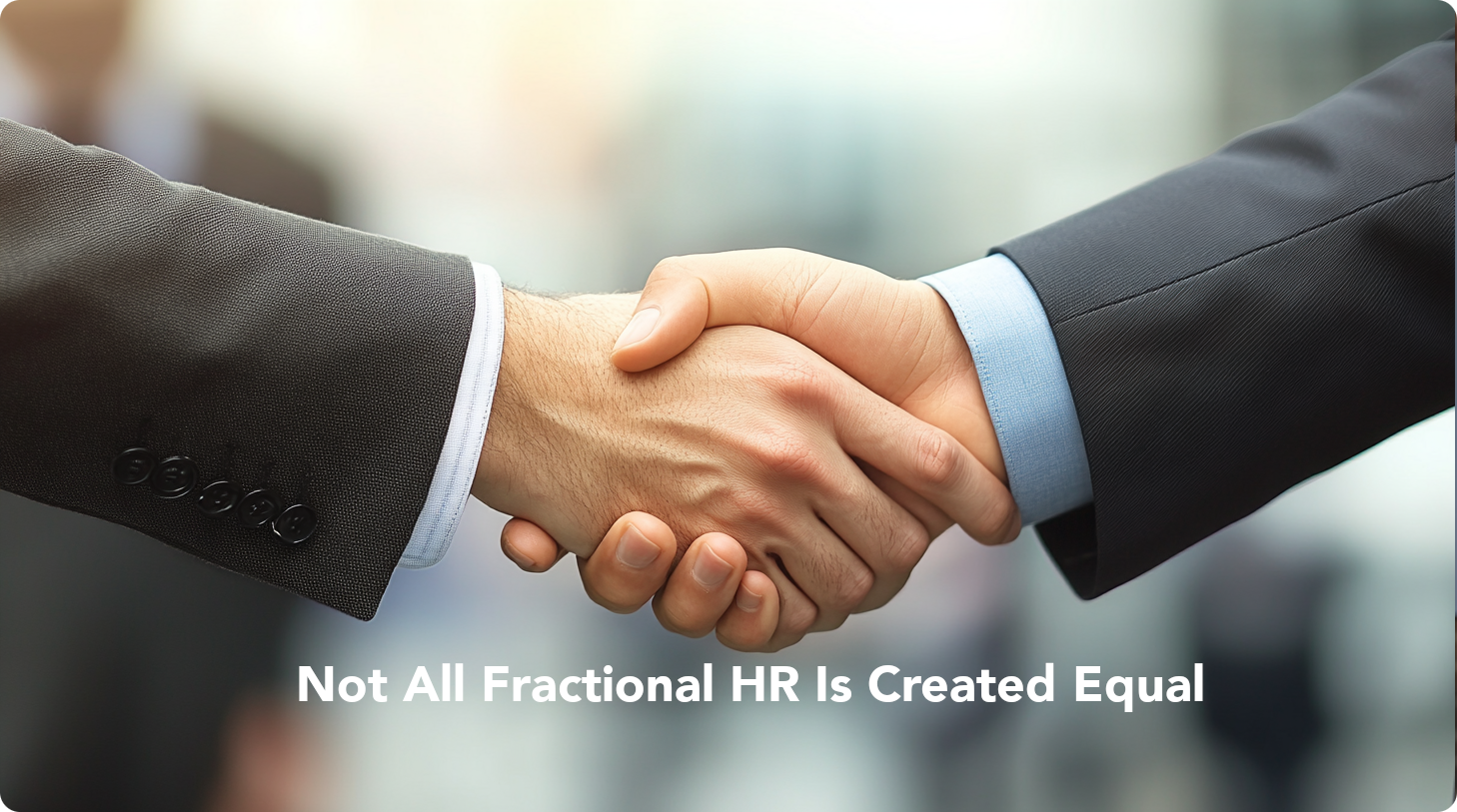Most people hear “fractional HR” and think: contracts, compliance, and culture decks written in Google Docs.
Startups that work with a fractional HR partner for growth can scale faster, improve hiring precision, and build people systems that protect culture and retention.
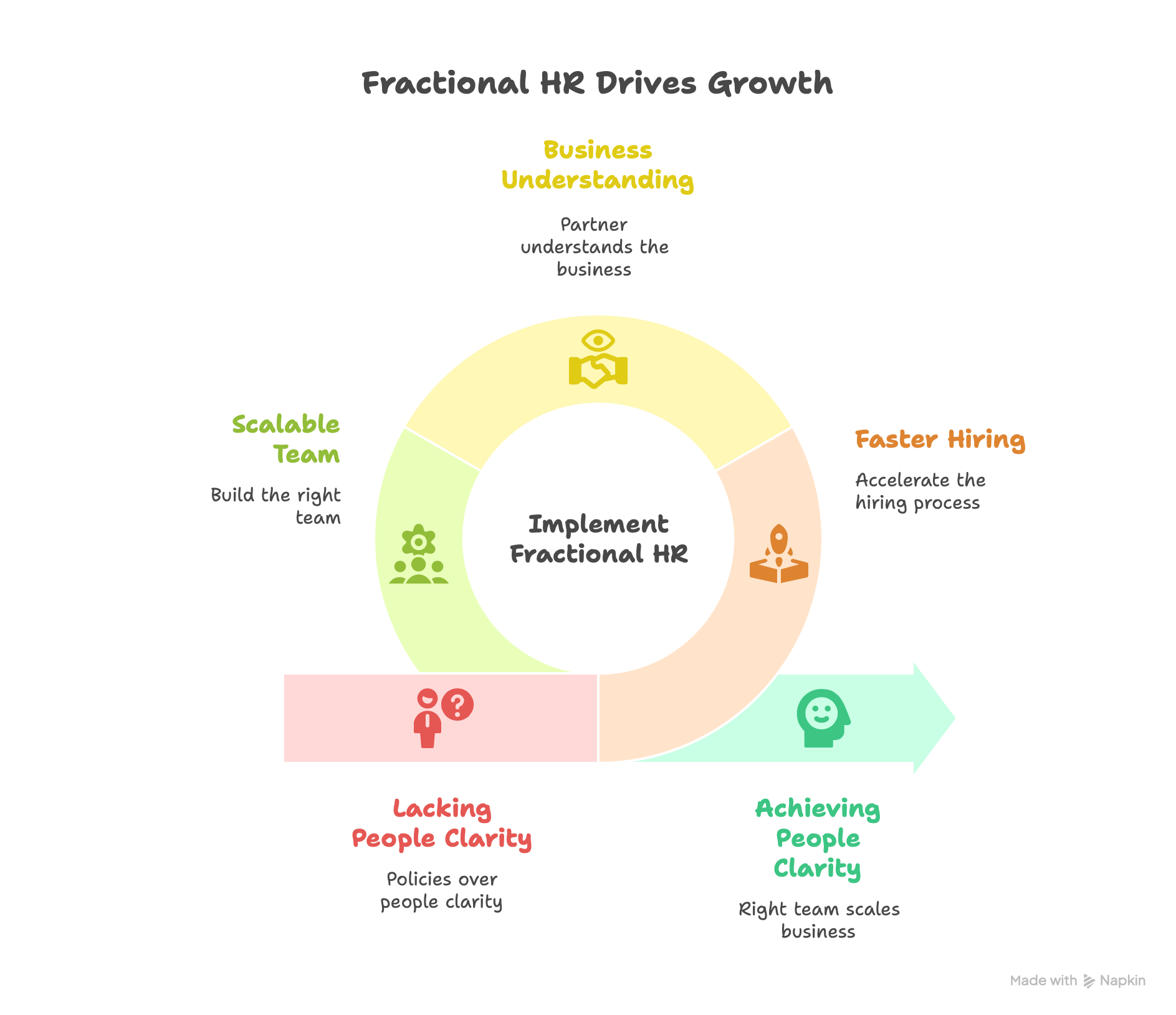
But if that’s all you’re getting — you’re wasting your money.
Startups don’t need policies. They need people clarity.
They need hiring to move faster.
They need a partner who gets the business — and can scale it with the right team in place.
In this article, we unpack what fractional HR should mean for modern startups — and how to choose a partner who actually drives growth.
65% of startups fail due to team-related issues, not product or market (CB Insights).
The Problem with Fractional HR
Too often, “fractional HR” is just a buzzword for:
- Freelancers who set up payroll, then disappear
- Agencies who push templated playbooks
- Advisors who tell you to hire a People Manager… without telling you what they should do
This model may check boxes — but it doesn’t build teams, improve hiring, or solve root issues.
And it certainly doesn’t help you move faster, with less risk.
What Startups Really Need from Fractional HR
Founders don’t need more decks.
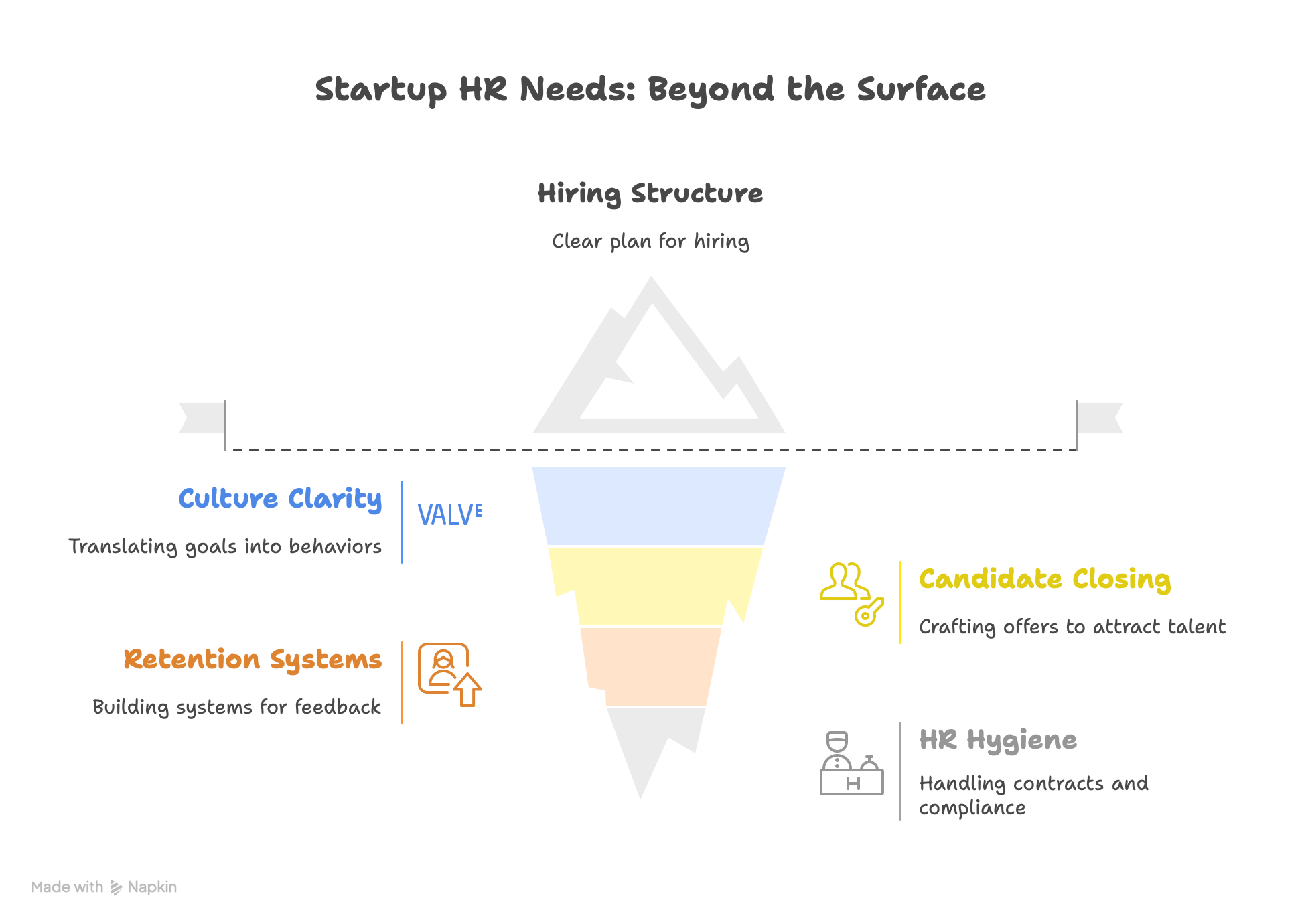
They need someone who can step in and say:
"Here’s what’s missing. Here’s the plan. I’ll help you fix it.”
The right fractional HR partner helps you:
How to Choose the Right Fractional HR Partner
Don’t just ask:
“Do they have experience in HR?”
Ask:
✅ Do they understand the founder journey?
✅ Can they design systems, not just react to problems?
✅ Do they care about outcomes, not optics?
🚩 Red Flags: When Fractional HR Goes Wrong
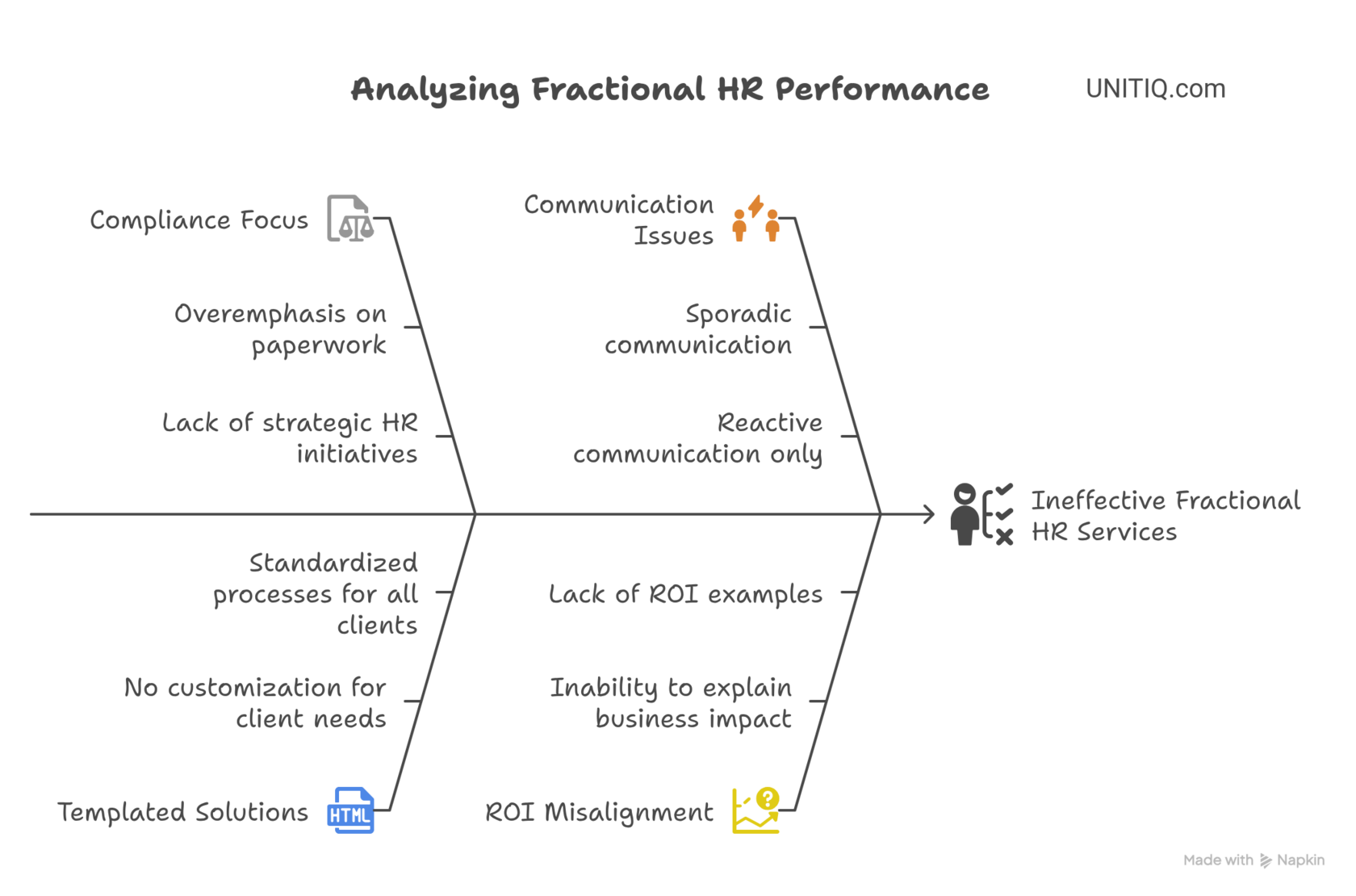
Warning signs of poor fractional HR:
- They focus only on compliance and paperwork
- No customization - everything is templated
- They can't explain how their work impacts business metrics
- Communication is sporadic or reactive only
- They recommend hiring full-time HR too quickly
Questions that reveal poor partners:
- "We use the same process for all clients"
- "You just need better policies"
- "Hire a People Manager and we'll train them"
- Can't provide specific ROI examples
How to Get Started with Fractional HR (4-Week Roadmap)
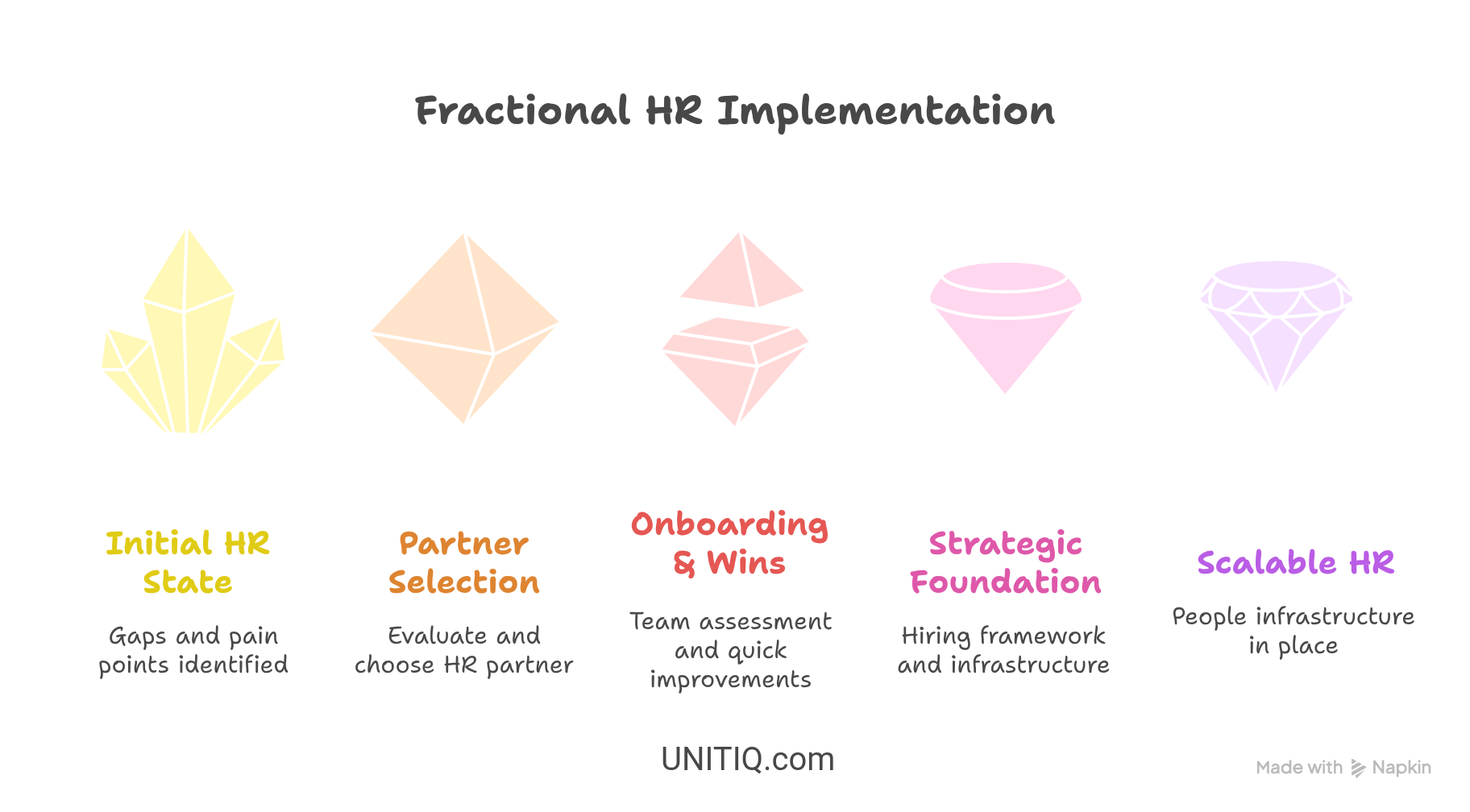
Week 1: Assessment & Planning
- Audit current HR gaps and pain points
- Define immediate vs. long-term people needs
- Interview 2-3 fractional HR partners
Week 2: Partner Selection
- Evaluate candidates against startup-specific criteria
- Check references with similar-stage companies
- Define scope and success metrics
Week 3: Onboarding & Quick Wins
- Partner conducts team assessment
- Identify 1-2 immediate improvements
- Set up regular check-in cadence
Week 4: Strategic Foundation
- Develop hiring framework and interview process
- Create basic people infrastructure
- Plan 90-day roadmap for scaling
The ROI of Fractional HR: What It Actually Costs vs. Delivers
Cost Comparison:
- Full-time HR Manager: $100,000-150,000/year + benefits
- Recruiting Agency: 20-30% of each hire's salary
- Quality Fractional HR: $4,000-7,000/month with measurable outcomes
Typical ROI in 6 months:
- 40% faster time-to-hire (saves 2-3 weeks per role)
- 50% improvement in candidate close rates
- 25% reduction in early employee turnover
- Clear hiring process that scales with growth
How to Measure Fractional HR Impact
Month 1-3: Foundation Metrics
- Time-to-hire improvement (target: 25% reduction)
- Interview-to-offer conversion rate
- New hire feedback scores
Month 4-6: Scaling Metrics
- Employee retention rates
- Team satisfaction survey results
- Manager confidence in people processes
Month 7-12: Growth Metrics
- Quality of hire assessments
- Internal promotion rates
- Culture and engagement scores
UnitiQ’s Fractional HR Model
We’re not an agency.
We don’t disappear after the first onboarding session.
We act as your embedded Talent & People Partner, shaping the structure, process, and psychology behind your team.

We bring:
- 🎯 Hiring precision: From job design to interview frameworks
- 🧱 People infrastructure: Feedback, onboarding, performance clarity
- 🧠 Psychology-informed insights: Real behavior change, not surface fixes
- 🚀 Startup-grade speed: We know the pace. We match it.
And yes — we do it fractionally.
So you get full-stack support without full-time cost.
A Series A SaaS startup implemented fractional HR focused on hiring structure and performance clarity. Within 6 months, they reduced time-to-hire by 40% and improved new hire retention to 90%.
When Startups Should Use Fractional HR
You don’t need to wait for 50 people.
If you’re:
- Hiring across multiple roles
- Struggling with team clarity or retention
- Wondering “how do we actually build culture?”
- Spending hours interviewing but not closing candidates
You’re already overdue.
Companies that adopt flexible HR models see 30% higher retention during scaling phases (SHRM).
FAQ Section
How much does fractional HR cost for startups?
Quality fractional HR typically costs $8,000-15,000/month, significantly less than a full-time hire while providing specialized expertise and immediate impact.
What's the difference between fractional HR and HR consultants?
Fractional HR partners are embedded in your business long-term, while consultants typically provide one-off projects. Fractional partners understand your context and grow with you.
At what stage should startups consider fractional HR?
Start considering fractional HR at 8-15 employees when hiring becomes consistent and people operations impact daily productivity.
How do you measure fractional HR success?
Track time-to-hire, candidate close rates, employee retention, team satisfaction scores, and how quickly new processes get adopted.
Can fractional HR help with remote team management?
Yes, fractional HR specializes in building systems for remote teams including communication frameworks, performance management, and virtual culture building.
What should I look for in a fractional HR partner?
Look for startup experience, system-building capability, outcome focus rather than task completion, and cultural alignment with your business stage.
Final Thought
Fractional HR doesn’t have to mean lightweight.
Done right, it means focused.
Strategic. Embedded. Outcome-driven.
If you want to build a team that moves fast, stays aligned, and grows with the business — start with the right kind of HR partner.
Fractional HR as Growth Strategy
Fractional HR isn't about having someone handle your people tasks—it's about building the systems and capabilities that let your startup scale without breaking.
The companies that grow successfully don't wait until they have people problems. They build people advantages before they need them.
Ready to turn your people operations into a competitive advantage? Let's discuss how fractional HR can accelerate your startup's growth while building the team culture you want.
Comparison Table
Related Reading
About Author
Olga Fedoseeva is an award-winning HR executive and people strategist with over 20 years of international experience across EMEA, the US, and APAC. Currently Chief of Staff at Exponential Science and Founder of UnitiQ, she has personally hired more than 1,000 employees and scaled organizations from 30 to 3,000 staff. Recognized as one of the Top HR Women in EV (2021), Olga has led global HR transformation, talent acquisition, and people operations for startups, scale-ups, and multinational enterprises. Her expertise spans the full HR lifecycle—succession planning, DEI, HR tech integration, workforce planning, and executive coaching—helping businesses align people strategies with growth objectives while fostering inclusive, high-performance cultures.
